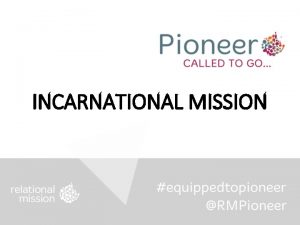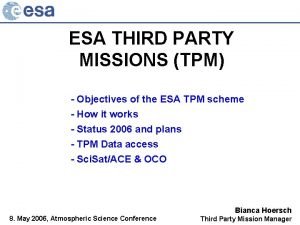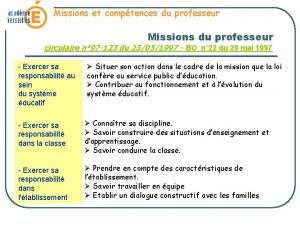Mission Preparation Incarnational Missions Preparation for the Mission


















- Slides: 18

Mission Preparation Incarnational Missions

Preparation for the Mission Field • Three Areas of Personal Preparation – Spiritual Preparation – Interpersonal Relationships – Intellectual Development

Preparation for the Mission Field • Spiritual Preparation – On the foreign field, we usually do not have the spiritual supports of a congregation and more mature Christians. – Times of stress call for spiritual strength – Personal devotional and quiet time • Make it a habit as missionary work is very busy – Misunderstanding to think one will increase in spiritual activities and develop. Dealing with daily problems, strange living conditions, and busy work can consume the missionary.

Preparation for the Mission Field • Interpersonal Relationships – Fruit of the Spirit (Gal. 5: 22 -23). – Dissension between missionaries cause most of the break-ups among teams. • Team retreats • Maintenance time • Refresh time – Selflessness consideration for others is necessary – Host people

Preparation for the Mission Field • Interpersonal Relationships – Missionaries voluntarily put themselves under a lot of pressure. • Group dynamics experience in controlled situation with means of continuing on the field. – Know yourself, leader or a follower; highly social vs. non-social. – Personal and family considerations must be examined. • Work verses family time. Responsibilities verses capable of assuming.

Preparation for the Mission Field • Intellectual Development – Bible training – Will deal with variety of religions – Deal with new questions not a part of home culture – Missions training

Preparation for the Mission Field • Intellectual Development – Training programs • • • Combination of training and experience Be prepared for a lifetime of study Informal study Formal study Local evangelistic experience Special seminars for cross-cultural experience Identify ethnocentric views and behavior Apprenticeship (mentioned above) Advanced training after years of experience

Preparation for the Mission Field • Intellectual Development – Significant areas of study • • • Missiology Theology of missions Church growth Linguistics Cultural anthropology Administration Para-medical and survival training Appropriate technology Leadership training

Incarnational Missions Incarnational Mission – refers to missionaries’ practice of missions as Christ was incarnate as a person by incarnating themselves in the new cultural context by identification with the people through personal interaction by learning the language and culture to better proclaim the gospel.

Incarnational Missions Identification – It is empathy between communicants involving a compassionate, interpersonal, reciprocal sharing of feelings and concepts. - Compassion - Interpersonal - Reciprocal sharing of feelings and concepts - Purposeful participation in the lives of others

Incarnational Missions § Jesus the supreme example of identificational principle through his incarnation. § Types of Identification § Outer identification - Appear to be like the people but inside they are very distant. § Inner identification – (Psychological) envolves the missionary’s attitudes, his understanding of, and empathy with the people to whom he is ministering.

Incarnational Missions q. Identificational traits q. Language learning q. Appreciation for cultural values q. Understanding felt needs and aspirations q. Evaluate cultural traits in context q. Willingness to be known q. Establish one-on-one relationships q. Focus on people instead of programs q. Exchange home visits q. Adjust standard of living to local conditions

Incarnational Missions q. Indentificational barriers q. Ethnocentrism – belief in one’s own pattern of behavior (or ethnic group) is best, most natural, most correct, or most important. q. Withdrawal and isolation q. Cultural overhang – use methods for home culture q. Ridiculing q. Way of life q. Beliefs, spiritual phenomena, experiences q. Political systems q. Impatience q. Imported frills

Incarnational Missions q. Extractionism - Pulling people out of their home cultures and into the missionaries’ surroundings and arena of comfort.

Incarnational Missions Identificational vs. Extractionism • IDENTIFICATIONAL MISSIONS – Learning: Missionary see him/herself as a learner in the culture. – Relationship: The relationship is reciprocal and sharing cultures and lives. – Language: Missionary learns the language. – Thought forms: Use indigenous thought forms. – Ministry: Interpersonal ministry – Living: Interactional, in neighborhoods

Incarnational Missions Identificational vs. Extractionism • EXTRACTIONISM MISSIONS – Learning: Missionary assumes the knowledge he/she possesses is enough and learning is not necessary. Not cultural specific. – Relationship: Want the people to come to and understand one's own culture and distance oneself from their culture. – Language: Don't learn the language and make due with a translator. – Thought forms: Uses Western thought forms. – Ministry: Institutional – Living: Missionary compound, insulated

Incarnational Missions Identificational vs. Extractionism • POSITIVES FOR IDENTIFICATIONAL MISSIONS – Assumes all people are different – Takes into account the elements of society that divide people. – Strive to develop churches and institutions that become independent from the missionary but dependent on God – Do not import Western styles, thought forms, and teaching – Teaches them to learn to interpret scripture and apply it within their culture and daily frame of reference. – Show compassion and empathizes with their daily struggles rapport. – Spend a great deal of time out among the people. – Show mutual respect, sharing, and giving (Eph. 4: 32; Rom. 12: 10, 15 -16; Col. 3: 13)

Incarnational Missions Identificational vs. Extractionism • NEGATIVES FOR EXTRACTIONISM MISSIONS – Assumes all people are the same – Seldom takes into account ethnic, sociological, and economic realities – Often create churches and institutions dependent on outside support and leadership – Secularize the non-Western societies (converted them to the west not God) – Requires a high degree of indoctrination with a long period of dependence on the missionary because the nationals are placed in a foreign frame of reference. – Do not empathize with the people and the problems they face – Spend a minimum of time out among the people – Look down on the people (lack of education, cleanliness different)
 Incarnational mission
Incarnational mission Incarnational sonship
Incarnational sonship Spanish missions in texas
Spanish missions in texas California missions map
California missions map Theology of missions
Theology of missions Why did the spanish build missions in texas?
Why did the spanish build missions in texas? Missions and presidios in texas
Missions and presidios in texas Aims missions
Aims missions Map of the california missions
Map of the california missions What were missions presidios and haciendas
What were missions presidios and haciendas Spanish missions in georgia
Spanish missions in georgia Esa third party missions
Esa third party missions How can kinetic energy help a rescue team
How can kinetic energy help a rescue team What are the 21 missions in order?
What are the 21 missions in order? Why did the spanish establish missions in texas
Why did the spanish establish missions in texas Mobile baptist association
Mobile baptist association Critical missions swat
Critical missions swat Day missions library
Day missions library Free methodist world missions
Free methodist world missions































